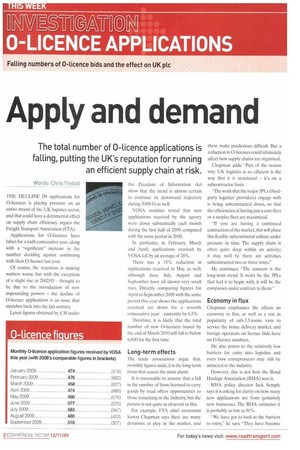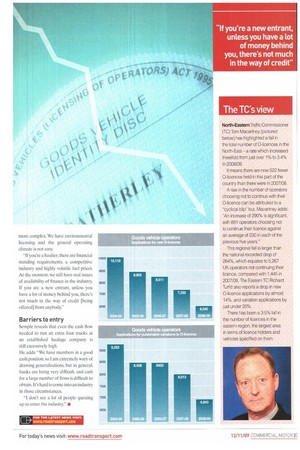Apply and demand
Page 22

Page 23

If you've noticed an error in this article please click here to report it so we can fix it.
The total number of 0-licence applications is falling, putting the UK's reputation for running an efficient supply chain at risk.
Words: Chris Tindall THE DECLINE IN applications for 0-licences is placing pressure on an entire strand of the UK logistics sector, and that could have a detrimental effect on supply chain efficiency, argues the Freight Transport Association (PTA).
Applications for 0-licences have fallen for a sixth consecutive year, along with a "significant" increase in the number deciding against continuing with their 0-1icence last year.
Of course, the recession is making matters worse, but with the exception of a slight rise in 2002/03 thought to be due to the introduction of new impounding powers the decline of 0-licence applications is an issue that stretches back into the last century.
Latest figures obtained by CM under the Freedom of Information Act show that the trend is almost certain to continue its downward trajectory during 2009/10 as well.
VOSA statistics reveal that new applications received by the agency were down substantially each month during the first half of 2009, compared with the same period in 2008.
In particular, in February, March and April, applications received by VOSA fell by an average of 28%.
There was a 15% reduction in applications received in May as well, although June. July, August and September have all shown very small rises. Directly comparing figures for April to September 2008 with the same period this year shows the applications received are down for a seventh consecutive year currently by 6.5% Therefore, it is likely that the total number of new 0-licences issued by the end of March 2010 will fall to below 6,000 for the first time.
Long-term effects The trade associations argue that, monthly figures aside, it is the long-term focus that causes the most alarm.
It is reasonable to assume that a fall in the number of firms licensed to carry goods by road offers opportunities to those remaining in the industry, but the picture is not quite as clear-cut as this.
For example, PTA chief economist Simon Chapman says there are many dynamics at play in the market, and these make predictions difficult. But a reduction in 0-licenses could ultimately affect how supply chains are organised.
Chapman adds: "Part of the reason why UK logistics is so efficient is the way that it is structured it's on a subcontractor basis.
"The work that the major 3PLs (th irdparty logistics' providers) engage with is being subcontracted down, so that the efficiencies of having just a core fleet or a surplus fleet are maximised.
"If you are having a continued contraction of the market, this will place this flexible subcontractor culture under pressure in time. The supply chain is often quite deep within an activity; it may well be there are activities subcontracted two or three times."
He continues: "The concern is the long-term trend. It won't be the 3PLs that feel it to begin with, it will be the companies under contract to them."
Economy in flux Chapman emphasises the effects an economy in flux, as well as a rise in popularity of sub-3.5-tonne vans to service the home delivery market, and foreign operators on licence bids, have on 0-licence numbers.
He also points to the relatively low barriers for entry into logistics, and even how entrepreneurs may still be attracted to the industry.
However, this is not how the Road Haulage Association (RIIA) sees it.
RHA policy director Jack Semple says it is asking for clarity on how many new applications are from genuinely new businesses. The RI IA estimates it is probably as low as 50%.
"We have got to look at the barriers to entry," he says. "They have become more complex. We have environmental licensing and the general operating climate is not easy.
"If you're a haulier, there are financial standing requirements, a competitive industry and highly volatile fuel prices. At the moment, we still have real issues of availability of finance in the industry. If you are a new entrant, unless you have a lot of money behind you, there's not much in the way of credit [being offered] from anybody."
Barriers to entry
Semple reveals that even the cash flow needed to run an extra four trucks at an established haulage company is still excessively high.
He adds: "We have members in a good cash position. so I am extremely wary of drawing generalisations, but in general, banks are being very difficult and cash for a large number of firms is difficult to obtain. It's hard to come into an industry in those circumstances.
don't see a lot of people queuing up to enter the industry." •
















































































































































